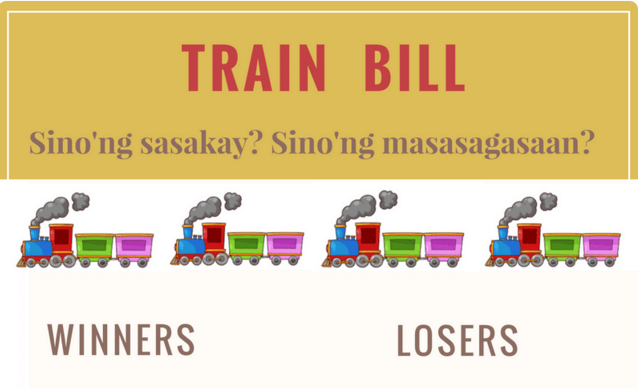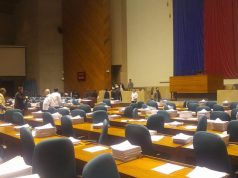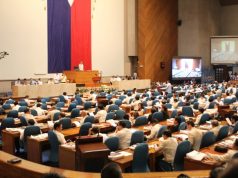MANILA, Philippines — Who would be on board and who would be left behind, if not run over, by the Duterte’s administration’s TRAIN (Tax Reform for Acceleration and Inclusion) Bill?
The proposed tax package seeks to lower the rate of personal income tax, giving salaried workers extra take-home pay. However, some lawmakers expressed fears this savings could be eroded by higher prices of goods and services as a result of the increase in excise taxes of oil-based products.
“Contrary to claims of the Duterte administration, the burden of oil excise and broader VAT (value-added tax) will not be borne by the rich. What the Lower House approved…are regressive taxes that will slam into the poor in the form of higher prices of basic commodities and services,” ACT Teachers Party-list Rep. Antonio Tinio said.
Fellow ACT Teachers Rep. France Castro added, “The Duterte administration aggressively pushed for the bill knowing full well that this TRAIN will run over all Filipinos, and most especially the poor.”
“New excise taxes will be slapped into products and services daily used by the people on top of the existing VAT, making life harder for the Filipino masses,” she added.
But Quirino Rep. Dakila Cua chairman of the House Committee on Ways and Means, insisted the bill “is pro-poor.”
“Sino ba ang mabubuwisan? Sa pag-aaral, iyong mayayaman at mas may kakayanan ang mabubuwisan [Who will be taxed more? Based on studies, it will be the rich, the well-to-do are the ones who will be taxed],” said Cua.
“’Yong [The] middle class, nakita n’yo naman, iyong kumikita ng [you see, those who earn] P250,000 annually ay tax free, plus may [there is] P100,000 tax-free bonus,” the lawmaker said.
“Lalapad ang ating middle class [We will have a broader middle-class base]. That is the start of our dream, to become a high-middle income nation. It won’t happen overnight, but this is the first step,” Cua added.
BELOW IS A SUMMARY OF THE “WINNERS” AND “LOSERS” IN THE TRAIN BILL.
Tax Reform for Acceleration and Inclusion BILL by arsabangan
Who wins?
According to the Department of Finance, when implemented, the TRAIN bill would benefit close to five million taxpayers consisting of 1.8 million minimum wage earners who are exempted from paying income tax and about three million other earners with a net taxable income of P250,000 and below, who would also be tax-exempt.
Meanwhile, the bill would tax individuals earning over P250,000 starting January 1, 2018, 2019 and 2020 as proposed below:
-Over P250,000 but not over P400,000 – 20 percent of the excess over P250,000
-Over P400,000 but not over P800,000 – P30,000 + 25 percent of the excess over P400,000
-Over P800,000 but not over P2 million – P130,000 + 30 percent of the excess over P800,000
-Over P2 million but not over P5 million – P490,000 + 32 percent of the excess over P2 million
-Over P5 million – P1.45 million + 35 percent of the excess over P5 million
The bill’s proposed tax schedule beginning January 1, 2021 and onwards would be:
-Over P250,000 but not over P400,000 – 15 percent of the excess over P250,000
-Over P400,000 but not over P800,000 – P22,500 + 20 percent of the excess over P400,000
-Over P800,000 but not over P2 million – P102,500 + 25 percent of the excess over P800,000
-Over P2 million but not over P5 million – P402,500 + 30 percent of the excess over P2 million
-Over P5 million – P1,302,500 + 35 percent of the excess over P5 million
Individuals who receive bonuses would also benefit from the proposed legislation. Under the bill, the first P100,000 (from the present P82,000) in the 13th month pay and other employee bonuses would be tax-free.
Members of cooperatives would likewise have an advantage as the bill would allow them to continue enjoying VAT exemptions on their gross receipts from lending activities by credit or multi-purpose cooperative. Sales by agricultural cooperatives would also remain VAT-free.
Senior citizens and persons with disabilities are also among the beneficiaries as sales or lease of goods and services to them would still not be subject to VAT.
Moreover, the Bureau of Internal Revenue and Bureau of Customs would gain from the measure as the bill’s mandatory fuel marking system would help curb smuggling and require businesses to transmit data through an electronic sales reporting system.
Who loses?
However, consumers of 12 products, mostly oil-based, would stand to lose from the TRAIN Bill that seeks to raise the excise taxes of the following commodities by P3 per liter effective January 2018; P2 per liter effective January 2019; and, P1 per liter effective January 2020:
1) Unleaded and leaded gasoline
2) Diesel
3) Liquefied petroleum gas
4) Lubricating oils and greases
5) Processed gas
6) Waxes and petrolatum
7) Denatured alcohol
8) Naptha
9) Aviation turbo jet fuel
10) Kerosene
11) Asphalts
12) Bunker fuel oil
Also, buyers of new vehicles would be among the losers. The bill proposes that effective January 2018, new vehicles with a net manufacturer’s price starting at P600,000 would have an additional tax of between 3 percent and 120 percent in excess of a varying covered values.
Moreover, consumers of sugar-sweetened beverages are expected to pay more for the refreshments they consume as the bill seeks to increase by P10 a liter the excise tax on these products, which include the following:
1) Sweetened juice drinks
2) Sweetened tea and coffee
3) All carbonated beverages with added sugar including those with caloric and non-caloric sweeteners
4) Flavored water
5) Energy drinks
6) Sports drinks
7) Powdered drinks not classified as milk, juice, tea and coffee
8) Cereal and grain beverages
10) Other non-alcoholic beverages that contain added sugar
11) Caloric sweetener and artificial sweetener
Another would be-losers are renters of houses or apartment units with rental fees below P10,000. VAT exemption for these fees would be removed and thus an additional 12 percent to the rental fees would be imposed.
Lotto winners would likewise be among the losers as the bill would impose a final tax rate of 20 percent on lotto winnings, except on prizes amounting to P10,000 or less. For example, if a person wins P1 million, his take-home amount would be P800,000.
In addition, individuals who receive interest from their bank deposits and royalties would be put at a disadvantage if the bill becomes law.
The measure seeks the imposition of a final tax rate of 20 percent on the amount of interest from any currency bank deposits and yield from other monetary benefit from deposit substitutes and from trust funds and similar arrangements.
Also, a final tax of 10 percent would be imposed on royalties, except books, literary works, and musical compositions.









